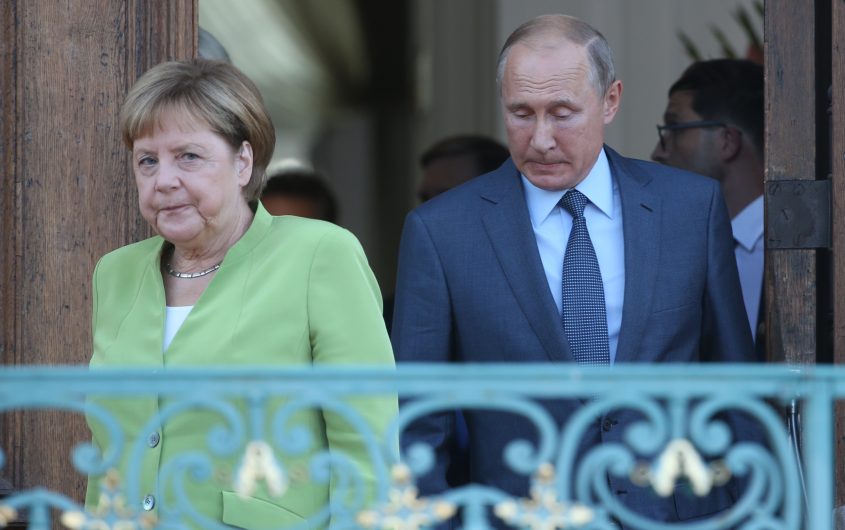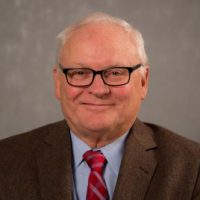
Mikhail Svetlov/Getty Images
Germany and Russia: A Reset?

Stephen F. Szabo
Senior Fellow
Dr. Stephen F. Szabo is a Senior Fellow at AICGS, where he focuses on German foreign and security policies and the new German role in Europe and beyond. Until June 1, he was the Executive Director of the Transatlantic Academy, a Washington, DC, based forum for research and dialogue between scholars, policy experts, and authors from both sides of the Atlantic. Prior to joining the German Marshall Fund in 2007, Dr. Szabo was Interim Dean and Associate Dean for Academic Affairs and taught European Studies at The Paul H. Nitze School of Advanced International Studies, Johns Hopkins University. He served as Professor of National Security Affairs at the National War College, National Defense University (1982-1990). He received his PhD in Political Science from Georgetown University and has been a fellow with the Alexander von Humboldt Stiftung, the Woodrow Wilson International Center for Scholars, and the American Academy in Berlin, as well as serving as Research Director at AICGS. In addition to SAIS, he has taught at the Hertie School of Governance, Georgetown University, George Washington University, and the University of Virginia. He has published widely on European and German politics and foreign policies, including. The Successor Generation: International Perspectives of Postwar Europeans, The Diplomacy of German Unification, Parting Ways: The Crisis in the German-American Relationship, and Germany, Russia and the Rise of Geo-Economics.
Angela Merkel’s meeting with Vladimir Putin this past weekend in Meseberg is a sign of the beginning of a reset in the German relationship with Russia. Putin arrived after having taken his charm offensive to Austria amid growing support from a number of European leaders to “normalize” relations with Moscow. The political leadership in Austria, Italy, and Hungary, along with the Trump-Putin bromance, have placed Germany and Chancellor Merkel in a difficult position.
A recent study of European national policies toward Putin’s efforts to destabilize European democracies by Kremlin Watch listed nine EU member states as either “Collaborators” or “In Denial,” with only five (the Baltic states, the UK, and Sweden) as clear defenders against Russian efforts to destabilize Europe. Nine, including Germany, are categorized as “The Awakened.” In the words of the report:
“Nine of these states experienced a strategic shift or “awakening” after the annexation of Crimea or direct attempts to meddle in their internal affairs and are now nearing the helm of the fight against Russian hostile influence operations. However, their practical strategies for countering Russian subversion are still under development, and some have weak spots that require redress (Spain, France, The Netherlands, Germany, Romania, Finland, Czech Republic, Denmark, Poland). There are noticeable differences in the depth and complexity of their national strategies.”
Despite President Trump’s claim that Germany is “totally controlled” by Russia, the chancellor remains the pillar of Europe’s Russia policy and continues to be the main reason European sanctions on Russia continue. Stefan Meister, one of Germany’s leading Russia watchers, characterized the most recent meeting as, a “pragmatic interest-driven” one. Both Putin and Merkel, as Meister contends, do not want to be blackmailed by Trump. They both want to find a way to keep the nuclear deal with Iran alive and are seeking ways to end the conflict in Syria, and with it the flow of refugees into Germany. Merkel also has to take into account increasing pressure from within Germany for a return to a more realist or business-like relationship with Russia. Within the Bundestag, only the Greens and some of the Christian Democrats maintain support for a tough line on Russia. Her Social Democratic foreign minister, Heiko Maas, has also been surprisingly tough on Putin but his party remains wedded to a softer line. The German public does not trust or like Putin, but they think he is more reliable than Trump and conclude that Germany has to live with Russia. The fact that Merkel came out in support of the contentious Nord Stream 2 (NS2) gas pipeline is an important signal given that she has long been a skeptic of the project.
Merkel also has to take into account increasing pressure from within Germany for a return to a more realist or business-like relationship with Russia.
Still, as Meister points out, there are real limits to any Germany reset of its Russia policy. Do not expect Merkel or Maas to present Putin or foreign minister Sergey Lavrov with a reset button, although if they did it would have the correct Russian translation. Having grown up in Communist East Germany, Angela Merkel has few illusions about the character of the former KGB agent in East Germany who is now the Russian president. The status of eastern Ukraine remains a huge sticking point. The German strategic community was badly shaken, or in the terms of Kremlin Watch, “awakened,” by Russia’s use of force in Ukraine and the lack of credibility of Russian leaders. Putin and his team have lost the confidence of Germany’s leaders who no longer can believe what they hear from Moscow. This is a serious impediment to a pragmatic relationship. Unlike the U.S., Germany has been quite effective in dealing with Russian information warfare in the recent German election—although it has a long way to go in the cyber defense area. The German business community is more sanguine now about the prospects for big profits in the Russian economy than it was in 2014 given both massive corruption and its lack of diversification. China rather than Russia will be the future economic focus of the German private sector.
The Nord Stream pipeline project, as Eugene Rumer recently argued, should be kept in perspective. German dependence on Russian gas and oil is below 40 percent of its total gas and oil consumption and Berlin has a growing number of options to substitute for these imports as it moves toward an economy driven by renewable energy sources. In addition, NS2 creates a growing Russian dependence on Germany, which will become the main hub for Russian energy exports into the EU if the Ukraine route is bypassed. In some respects, NS2 increases Russian incentives for a positive economic relationship with the EU and, given the reforms instituted by the EU Commission in the energy sector, European energy dependence is now more manageable than it was a decade ago.
Putin and his team have lost the confidence of Germany’s leaders who no longer can believe what they hear from Moscow. This is a serious impediment to a pragmatic relationship.
Still there are warning signs. Merkel is clearly nearing the end of her tenure as chancellor while Putin is not going anywhere; there is no German leader waiting in the wings with her resolve regarding Russia. The impact of the Trump presidency will leave a deep legacy of anti-Americanism in Germany and will foster a belief in equidistancing between Russia and the United States. German leaders now have to shape a foreign policy that can no longer take as a given a supportive America. All this means Germany is now at the beginning of the first major rethinking of its foreign and defense strategy since 1955 when it joined NATO. All this implies a series of resets far beyond the one with Russia.









